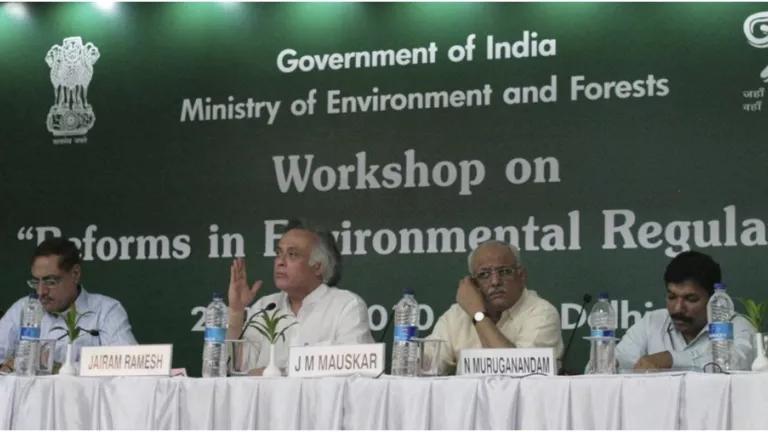Strengthening Environmental Compliance in India: Building New Institutions or Reinvigorating Existing Structures?

Just returning from Delhi, NRDC’s India initiative had the fascinating opportunity to engage with Indian NGOs, industry, and government officials to learn about their views on strengthening environmental compliance and enforcement. The Indian Ministry of Environment and Forests (MOEF) is proposing to create a new regulatory agency to “police” enforcement in efforts to ramp up compliance with clean air, water, and land laws. The structure and direction of the agency, and whether a new agency should be created at all, is being hotly debated among central government leaders, state officials, civil society, and business groups.
NRDC was honored to provide our perspective on compliance and enforcement based on our years of experience in the US and elsewhere, as Indian officials, NGOs, and industry work to find solutions. The debates during the Ministry’s public workshop in late May and discussions with NGO leaders in early June were captivating, especially as India works to balance protecting public health and promoting sustainable economic development.
Minister Jairam Ramesh explained that there is an urgency to improve enforcement, indicating that he receives hundreds of emails every day about devastating environmental impacts and proposed projects that shortcut environmental review. He explained that “it’s like cancer; the patient is in a terminal state.” The governing principles for the new agency are: strengthening the current monitoring system to catch violations early; decentralizing regulation so that the states and central government work together; redefining MOEF’s responsibilities; and creating an independent agency based on scientific integrity.
In the larger context of improving environmental governance, the Ministry explained that the proposed National Environmental Protection Authority (NEPA) would be related to the new Green Tribunal, established earlier this year. The proposed NEPA would ramp up administrative compliance and enforcement.
Environmental organizations, such as the Center for Science and Environment, indicated that the Ministry needed to better diagnose the problem, asking what exactly is the ministry seeking to fix. CSE’s Turnaround report highlights the shortcomings of Indian compliance and enforcement, including the lack of implementation of laws that are already on the books. CSE’s Chandra Bushan emphasized that investing in existing structures may be more effective than creating another institution. Leading Indian environmental attorney, Ritwick Dutta explained that reform must be linked to the environmental review process for major projects, especially in forests, given India’s rapid development. Meanwhile, industry groups, such as the Confederation of Indian Industries, welcomed the creation of a new agency that would streamline environmental processes.
Based on the discussions, Minister Ramesh identified eight key issues that must be examined before the legislation is proposed in Parliament:
- Explaining the justification and the reasons that a new agency is needed;
- Clarifying the relationships of existing structures, including the Central Pollution Control Board and State Pollution Control Boards;
- Outlining a better structure, because it is unreasonable to expect reform simply by transporting a flawed regulatory regime to a new agency;
- Linking the environment and forests in environmental compliance;
- Identifying clear funding sources for the agency to operate effectively;
- Defining the roles of non-central communities and institutions;
- Determining whether existing structures are really working; and
- Establishing accountability – who is going to monitor the monitor.
NRDC also hosted a session with Indian NGO’s at the World Wildlife Fund auditorium. Felicia Marcus, NRDC Western Director, discussed the role of US environmental organizations and EPA’s structure based on her earlier experience as Administrator for the U.S. Environmental Protection Agency, Region 9. Alex Wang, Director of NRDC’s China Law Program, discussed approaches to environmental regulations in China. We were able to learn about some of the Indian NGOs’ main concerns, including lack of monitoring and protecting the rights of indigenous groups. Some of the NGO leaders explained that the Indian context is drastically different from the developed world, given the scale and speed of development through forest communities. Others were interested in how NRDC and other groups use self-monitoring information to launch campaigns, prompt agency action, and file litigation to protect public health.

Returning to the US, the BP Gulf Coast disaster and the tragic injustice of the Bhopal verdict underscore the critical role that strong environmental compliance and enforcement play in stopping violations early and enforcing against egregious violators. The Ministry has indicated that it will study these questions and that the legislation may be postponed from the monsoon parliament to the winter parliament. NRDC remains open to learning more from our Indian colleagues and sharing our perspectives about the challenges and opportunities in protecting the environment.
(Photos: Alex Wang, NRDC)
